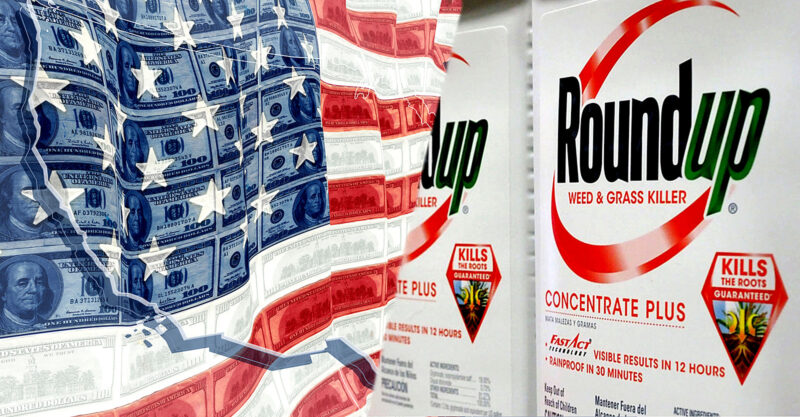Miss a day, miss a lot. Subscribe to The Defender's Top News of the Day. It's free.
Two weeks after a top Justice Department official advised the U.S. Supreme Court there was “no sound reason” for the high court to review a loss by Monsanto owner Bayer AG in nationwide Roundup cancer litigation, a coalition of large agricultural groups is demanding that President Joe Biden withdraw the opinion.
Bayer, which bought Monsanto in 2018, has looked to the high court as its last, and best, hope for putting an end to the ongoing litigation.
Bayer has asked the justices to take up the case, which centers on allegations that Monsanto’s glyphosate-based herbicides such as Roundup cause non-Hodgkin lymphoma (NHL).
But Solicitor General Elizabeth Prelogar advised the court in a May 10 brief that Bayer’s arguments for seeking Supreme Court review were “misconceived,” and said there was no valid dispute for the high court to consider.
The agricultural groups responded Monday with a blistering letter to Biden, alleging Prelogar’s brief established a “new policy” that “poses great risks to our science-based regulatory system and global food systems.”
Prelogar’s office did not respond to a request for comment.
The letter urges Biden to withdraw Prelogar’s brief and “consult with the U.S. Department of Agriculture regarding the implications of this decision for food production, environmental sustainability, and science-based regulation.”
Many of the organizations signing on to the letter have received financial support from Monsanto and/or Bayer for many years.
“We are concerned this monumental change in the federal government’s policy will not just threaten science-based regulation, but it risks undercutting food production and important environmental practices at a time when we cannot afford to hinder either,” the letter states.
The groups that signed the letter include the American Farm Bureau Federation, the American Soybean Association, the National Corn Growers Association, the National Association of Wheat Growers, the National Cotton Council, the American Sugar Alliance and CropLife America, the large agrochemical lobbying organization.
A question of labeling
Bayer filed its petition to the high court in August, asking the justices to review the U.S. Court of Appeals for the Ninth Circuit’s May 14, 2021, decision that affirmed a district court’s judgment in Monsanto’s 2019 trial loss to plaintiff Edwin Hardeman.
The jury, in that case, agreed with Hardeman’s attorneys that exposure to Monsanto’s glyphosate-based herbicide was a cause of Hardeman’s NHL and that Monsanto failed to warn of its product’s health risks, despite decades of science showing links between the herbicide and cancer.
Hardeman was awarded approximately $80 million by the jury, though the award was cut by the trial court judge to roughly $25.2 million.
“This letter is yet another Hail Mary attempt for Monsanto to deny its responsibility for injuring so many people,” said Hardeman lawyer Aimee Wagstaff. “It is too little too late.”
Bayer maintains Monsanto’s glyphosate herbicides do not cause cancer, and it additionally argues that the Federal Insecticide, Fungicide, and Rodenticide Act (FIFRA), which governs the registration, distribution, sale and use of pesticides in the United States, preempts “failure-to-warn” claims by Hardeman and other plaintiffs in the Roundup litigation.
Because the U.S. Environmental Protection Agency (EPA) has approved labels with no cancer warning, failure-to-warn claims should be barred, the company maintains.
In addition to the FIFRA issue, the company urged the Supreme Court to also address whether or not the Ninth Circuit’s standard for admitting expert testimony “is inconsistent” with precedent and federal evidence rules.
Bayer argues that the admission of expert testimony in Hardeman’s case “departed from federal standards, enabling plaintiff’s causation witnesses to provide unsupported testimony on the principal issue in the case, Roundup’s safety profile.”
The Solicitor General’s brief states that “FIFRA does not preempt respondent’s claims” and found that the evidentiary ruling by the court of appeals was proper.
More Roundup trials ahead
Though Bayer has agreed to pay more than $11 billion to try settling Roundup cancer claims — which at one point involved more than 100,000 plaintiffs — the company has been unable to appease all plaintiffs.
Some 30,000 plaintiffs continue to seek trial dates or settlements higher than offered.
One trial is underway in Kansas City, Missouri, this week, and more are scheduled in courts around the country over the next several months.
In the letter to Biden, the farm groups cite the EPA’s position that glyphosate is “not likely to be carcinogenic to humans.”
“Farmers utilize science-backed crop protection tools on their farms to produce safe, nutritious food,” American Farm Bureau Federation President Zippy Duval said in a press release announcing the letter to Biden.
“Allowing labels that conflict with existing conclusions and EPA studies will add to a greater misunderstanding of the crucial role pesticides play in enabling farmers to grow healthy, affordable food for America’s families.”
The litigation began in 2015 after the International Agency for Research on Cancer, an arm of the World Health Organization, reviewed years of independent research on glyphosate and Roundup, and found the weed killer to be a “probable human carcinogen.”
Originally published by The New Lede.








